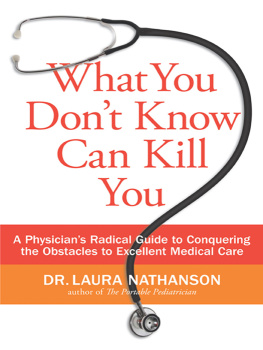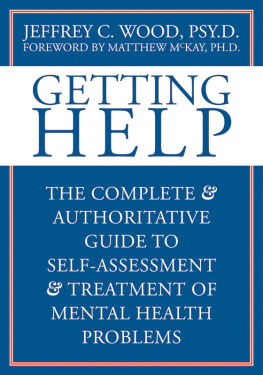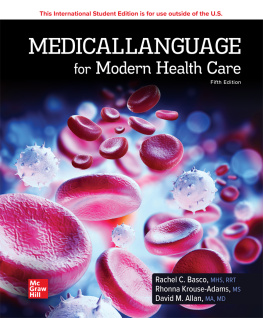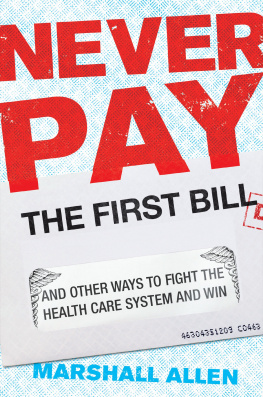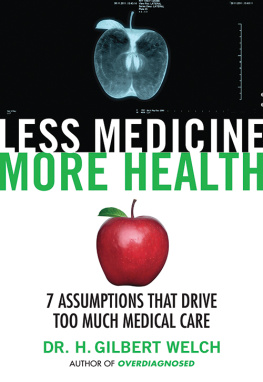I dedicate this book to the memory of my dearest Chuck.
Our medical care today is famously effective, producing apparent miracles; at the same time, it is notoriously error-prone. I have lived on both sides of this paradox.
Back when I was a pediatric resident, my child patients with the most common kind of leukemia all died; now 95 percent survive. In training, we were told not to try to resuscitate a premature baby of less than thirty-two weeks or under four pounds: now babies of twenty-six weeks and less than two pounds often survive. We used to think X rays and EKGs were pretty snazzy: ultrasounds, CT scans, and MRIs were just a twinkle in their inventors eyes. Yes, weve come a long way.
But Im also a bereaved wife. My beloved husband, Chuck Nathanson, age 61, died at home in my arms at dawn on June 5, 2003. A rare tumor of the thymus, a gland above the heart, had first shown itself on his chest X ray in January 2000. The tumor (a thymoma) was the size of a peach, but it went unrecognized by no fewer than six doctors.
A treatable tumor had shown up on an X ray but went undetected for twenty-two months! When I look back on that long period of delayed diagnosis and how we were then and later bounced around from one medical specialist to another, the image that pops into my head is that of a slightly mad, grotesque volleyball gamewith the patient as the ball.
There is not much teamwork going on in this game. The player in possession of the ball serves it with little or no expectation that the receiver will acknowledge the serve, much less return it. Sustained volleys are rare. Every now and then a referee from managed care comes through, stops the play, removes some of the players, and replaces them with others. Sometimes the ref picks up the ball and takes it off to a different game in a different part of the park.
Reports from the media suggest that this wacky medical care game is starting to border on anarchy:
- A tumor is missed on the chest X ray specifically ordered to check for one, and fifteen months later the world-famous paleontologist Stephen Jay Gould dies of a treatable cancer.
- Someone forgets to take the oxygen tank out of the room before the MRI machine is turned on; the tank becomes magnetized, hurtles around the room, and kills the six-year-old on the table.
- A baby in the neonatal intensive care unit is given breast milk through the tube that enters the vein, rather than through the tube inserted into the stomach, and the baby dies.
- An internist finds a lump in her breast, and her HMO refuses to let her have a mammogrameven if she pays for it herself.
These are not isolated events. Here is the judgment of Donald Berwick, MD, president of the Institute for Healthcare Improvement:
A patient with anything but the simplest needs is traveling a very complicated system across many handoffs and locations and players. And as the machine gets more complicated, there are more ways it can break.
Whether you prefer the image of an out-of-control volleyball game or a breakdown-prone machine, todays health care system violates the cardinal rule of effective management: Somebody must be in charge of any complex human system, or it is bound to malfunction.
Medical care today has led to one series of unintended consequences after another. Specialists and scientific discoveries proliferate, bringing with them an enormous need for coordination, interpretation, and above all, leadership in charge of the process. That need has gone unmet. As a result, patients oftenand justifiablyfeel that nobodys in charge.
- Your primary care physician and your specialists arent in charge. These hands-on clinical physicians are supposed to suggest possible diagnoses and order studies to arrive at what is called a definitive diagnosisthat is, a diagnosis that is not guesswork, but firmly established. If they work in a teaching office, hospital, or clinic, the people who actually do this work may be medical students or doctors-in-training. Their work is supposed to be critiqued by senior physicians.
When oversights and logical glitches occur, there is no one whose job it is to catch them. Moreover, there is no person or system whose job it is to make sure student doctors work is truly monitored. The people who commit such glitches are the very least likely ones to be able to spot and correct them. Everyone knows that as individuals we are pretty incapable of spotting our own logical flaws. We wouldnt want to put students in charge of grading their own papers, or scientists to serve as their own peer review. Every published book needs an editor, not just an author. - Data doctors arent in charge. These specialists are supposed to interpret the studies ordered by your clinical physicians. They may have no idea why a particular study was ordered, and may be too rushed to give that question full attention. In the process, errors and oversights occur and are rarely caught by the people who make them.
- In-hospital physicians arent in charge. Hospitalists have two conflicting duties: to care for inpatients and to keep the hospital itself running smoothly. Which duty overrides the other may be difficult for anyone, even the hospitalist, to determine.
- Nurses arent in charge. It used to be that nurses protected everyone: young physicians from their own inexperience, seasoned ones from loss of face, and patients from loss of faith. But we are in the midst of a nursing shortage that has amputated that part of the profession.
- Nobody tells you how to choose the right health care plan. It is in the interest of the plans that you choose one that is economical for that plan . Not the one that is best for you. That is why the plans tell you to start by choosing your primary care provider (PCP). But once you have done so, you have embedded yourself in that particular providers web of hospitals, specialists, and emergency rooms. That network has been negotiated for the financial benefit of the plannot for the individual needs of the patient.
Thats the bad news.
The good news is that you can become the person in charge of your ownor a loved onesmedical safety.
Yes, you . I am writing this book to help you avoid what happened to me and to my Chuck. I learned the lesson of the title in the very hardest way. If I had taken the precautions set forth in this book, my husband of thirty years might be with me today.
You wont need any medical training, and I promise not to try to teach you any. All you need is your human intelligence and caringand a guide. Thats my job.
At this time in America, there is only one sure way to safeguard yourself or someone you love. You must be your own fact-checker during the process of diagnosis, your own watchdog during hospitalization, and your own managed care advisor when choosing a health care plan.
Heres what Ive learned, and what you must learn if you wish yourself and your loved ones to survive a bout with serious illness. No matter who you are, physician or not, lucky or not; no matter how rich, famous, successful, good-looking, innocent, kindly or powerful; no matter how close and trusting the relationships you have with those providing your medical careyou cannot rely on todays medical system to keep you healthy, safe and alive.
I learned all this the hardest possible way. My great hope is that I can help you, my non-medically-trained readers, to seize hold of your own medical destiny in the interest of preserving your health and your very lives.

